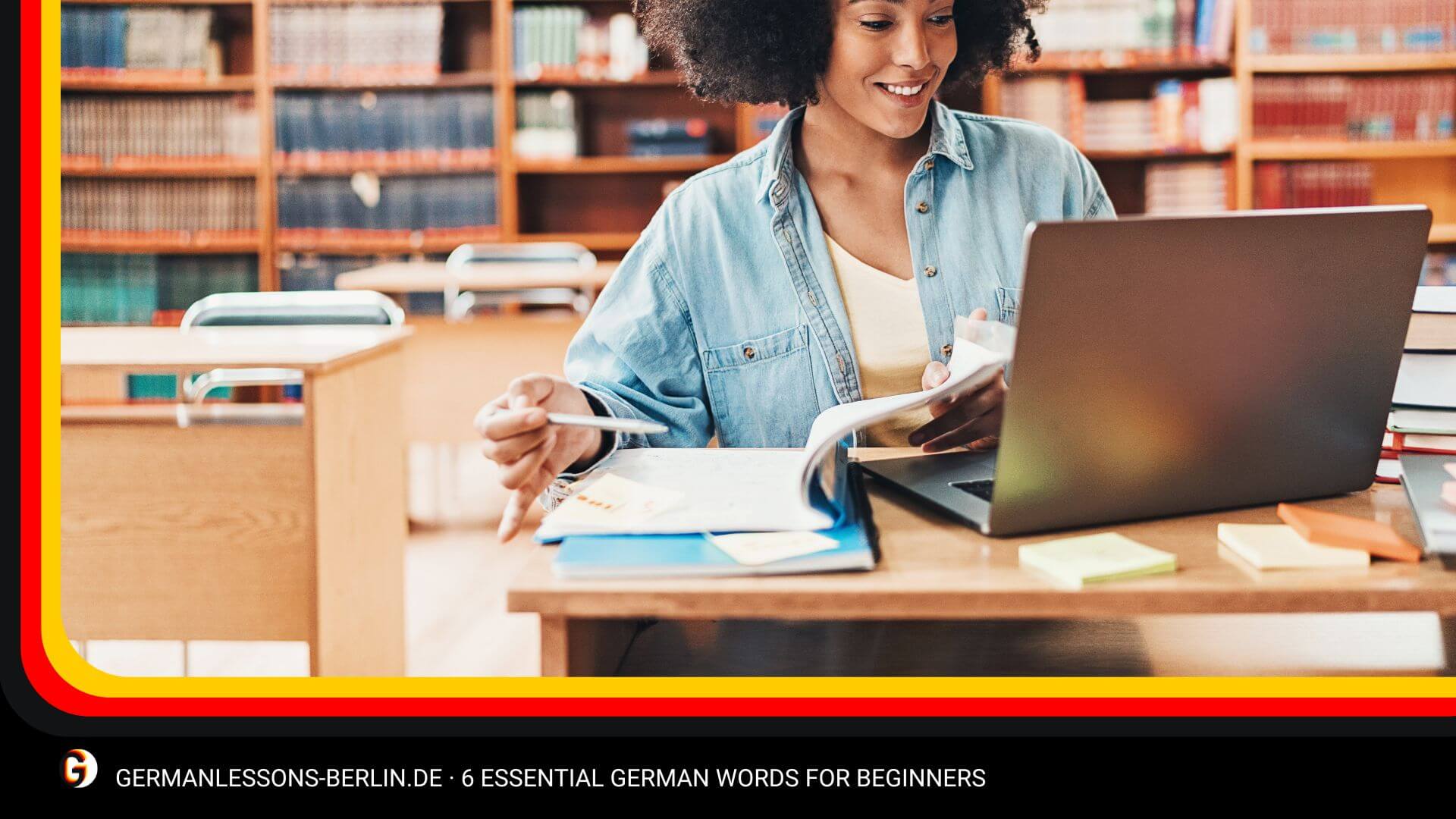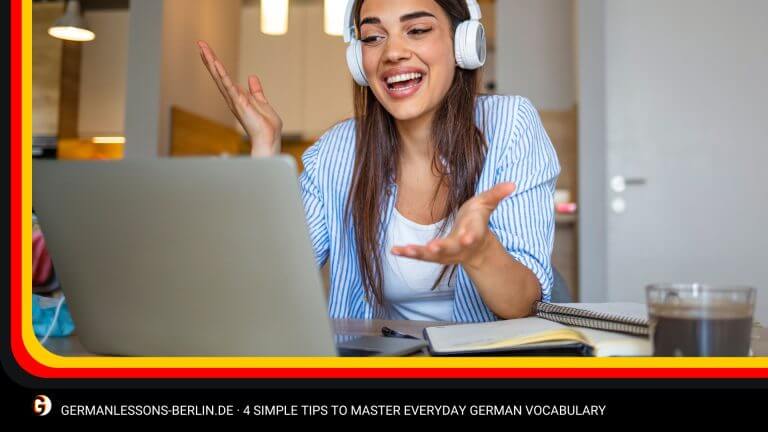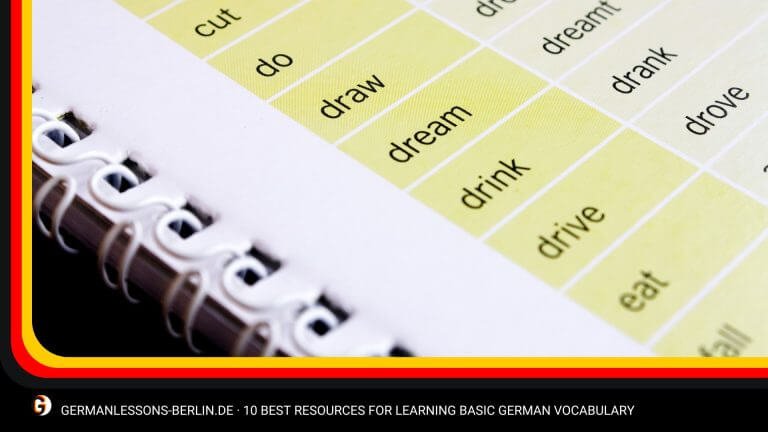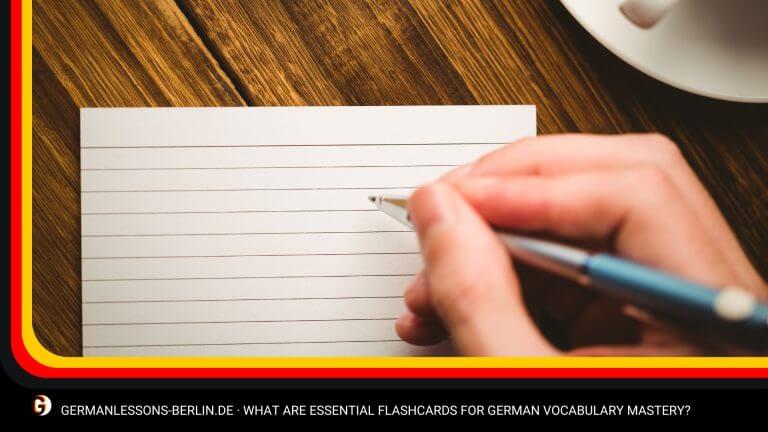I’m here to guide you through your first German steps. Trust me, learning these six essential words can open doors to new friendships and adventures. I’ve been there, starting with ‘Hallo’ and moving up. Whether you’re eager to thank someone with a heartfelt ‘Danke’ or need to ask for help, these basics will serve you well. So, let’s jump in together and lay the foundation for your German journey. It’s simpler than you might think!
Table of Contents
Key Takeaways
- Greetings like ‘Hallo’ and ‘Tschüss’ are cultural keys that unlock authentic exchanges.
- ‘Bitte’ and ‘Danke’ are crucial for courteous communication.
- ‘Ja’ and ‘Nein’ are fundamental words for basic conversations.
- Understanding question words like ‘Wer?’, ‘Was?’, and ‘Wann?’ is crucial for navigating conversations.
Greetings: “Hallo” and “Tschüss”
One can’t overstate the importance of proper greetings in German; I’ve found that starting with a friendly ‘Hallo’ (hello) or parting with a casual ‘Tschüss’ (bye) is essential in everyday interactions. These words aren’t just a signal to begin or end a conversation; they’re a cultural key that unlocks a more authentic and respectful exchange. ‘Hallo’ is versatile, fitting into almost any situation, whether I’m walking into a shop or meeting someone for the first time. On the flip side, ‘Tschüss’ is informal and best used with people I’m familiar with. It’s a word that conveys warmth as I take my leave. I always make sure I’m using these greetings appropriately – they’re simple yet powerful tools in my beginner German toolkit.
Politeness: “Bitte” and “Danke”
In my journey through the German language, I’ve discovered that mastering the polite expressions ‘Bitte’ (please) and ‘Danke’ (thank you) is crucial for courteous communication. These words aren’t just niceties; they’re the glue that holds social interactions together. When I ask for help or services, slipping a ‘Bitte’ at the end of my request shows respect and consideration. It turns a demand into a kind appeal.
I’ve also learned to never underestimate the power of ‘Danke’. Expressing gratitude with this simple word can turn a transactional exchange into a moment of genuine human connection. It acknowledges someone’s effort and often brings a smile to their face. For me, these words are the foundation of politeness in German, and using them feels like extending a friendly hand in a culture that values courtesy.
Affirmation and Negation: “Ja” and “Nein”
As a beginner, I’ve found that two of the most fundamental words in German are ‘Ja’ (yes) and ‘Nein’ (no), crucial for any basic conversation. They’re the building blocks for expressing agreement or disagreement, and they’re incredibly straightforward to use. ‘Ja’ signals acceptance or confirmation. When someone asks me if I understand something or if I’d like something, I respond with ‘Ja’ if it’s affirmative. Conversely, ‘Nein’ is the go-to word for negation. It’s what I say when I need to decline an offer or correct a misunderstanding. As simple as these words may seem, they’re powerful tools in my quest to communicate effectively in German. I’m constantly practicing to ensure my pronunciation is clear, as these are words I use all the time.
Basic Questions: “Wer?”, “Was?”, “Wann”
My next step in mastering basic German involves understanding the fundamental question words: ‘Wer?’ (who?), ‘Was?’ (what?), and ‘Wann?’ (when?). These words are crucial for asking questions and navigating conversations. As I delve into these, I’m finding that they’re quite straightforward, mirroring the simplicity and structure I’m accustomed to in English. Here’s a quick guide to help you grasp these essential words:
- Wer? – Use this word when you want to know about a person.
Example: Wer ist das? (Who is that?) - Was? – This one’s for inquiring about objects, ideas, or actions.
Example: Was ist das? (What is that?) - Wann? – Timing is everything, and this word helps you find out when something occurs.
Example: Wann beginnt der Film? (When does the movie start?)
Expressing Gratitude: “Danke”
One of the most common and heartfelt words I’ve learned in German is ‘Danke’, which means ‘thank you’. It’s a simple yet powerful way to express gratitude, and it’s vital for anyone starting out in German. I find it’s not just the word itself, but the way it’s said that conveys the sincerity of the thanks.
| German | English | Usage Context |
|---|---|---|
| Danke | Thank you | General appreciation |
| Danke schön | Thank you | Polite, slightly more formal |
| Danke sehr | Thank you very much | More emphatic thanks |
| Vielen Dank | Many thanks | Greater level of gratitude |
| Herzlichen Dank | Heartfelt thanks | Deep appreciation |
Seeking Assistance: “Hilfe”
Building on the gratitude theme, I’ve found that mastering the term ‘Hilfe’, which means ‘help’, is just as crucial for beginners seeking assistance in German-speaking contexts. When I’m in a bind, knowing how to ask for help can make all the difference. Here’s a quick guide:
- Entschuldigung, können Sie mir bitte helfen? (Excuse me, can you help me please?)
- Ich habe eine Frage. (I have a question.)
- Ich verstehe das nicht. (I don’t understand this.)
- Können Sie das bitte wiederholen? (Can you please repeat that?)
- Wo ist die Toilette? (Where is the bathroom?)
These phrases are my lifeline when I’m lost in translation. They’re simple, polite, and usually met with a friendly response. Getting help becomes a breeze once you’ve got these down!
Frequently Asked Questions
How Does the Formality of a Setting Influence the Choice of German Greetings Beyond ‘Hallo’ and ‘Tschüss’?
In more formal settings, I opt for greetings like “Guten Tag” instead of “Hallo” and “Auf Wiedersehen” rather than “Tschüss.” These choices reflect respect and professionalism. When I’m with friends or in casual situations, I’ll stick to the informal greetings. It’s crucial to match my language to the setting to ensure I’m not coming off as too stiff or overly casual. Adapting my vocabulary this way helps me navigate social interactions smoothly.
In What Situations Would ‘Bitte’ Be Used in a Context Other Than Expressing Politeness, and How Does Its Meaning Change?
I often use “bitte” in various scenarios beyond just being polite. It can mean “please,” but also serves as “you’re welcome” in response to thanks. When I want someone to repeat something, I’ll say “Wie bitte?” which translates to “Pardon?” In a restaurant, “bitte” can indicate I’m ready to order. The word’s versatility reflects its adaptability in everyday interactions, showing language’s fluidity isn’t confined to strict rules.
Are There Any Regional Variations in Germany for Commonly Used Words of Affirmation and Negation, Such as ‘Ja’ and ‘Nein’?
Sure, there are regional differences in how Germans say “yes” and “no.” In the north, you might hear “jo” instead of “ja,” and “nee” for “nein.” Bavarians might say “freilich” for “yes,” and in some areas, “doch” is used to contradict a negative question. It’s fascinating how dialects can add flavor to these common words, and I always make a point to pick up these nuances when I’m traveling through Germany.
What Are Some Alternative Basic Question Words in German That Delve Deeper Into Conversation Than ‘Wer?’, ‘Was?’, and ‘Wann’?
I often dive deeper into conversations by using additional German question words. “Warum?” asks “Why?” uncovering reasons. “Woher?” means “Where from?” which can reveal origins. “Wohin?” translates to “Where to?” pointing to destinations. “Wie?” is “How?” exploring methods or conditions. “Welche/r/s?” means “Which?” or “What kind?” for choices or distinctions. These words help me get more than just basic facts, opening doors to richer dialogues and understanding.
Can ‘Danke’ Be Modified to Express Different Levels of Gratitude, and if So, What Are Some Examples?
Sure, ‘danke’ can be tweaked to show varying degrees of thanks. For a casual thanks, I’d just say “Danke.” If I’m more grateful, I’d go with “Danke schön” or “Danke sehr.” To really emphasize my gratitude, I’d opt for “Herzlichen Dank” or even “Ich danke Ihnen vielmals,” which is quite formal. These expressions help me convey the right level of appreciation in different situations.
Conclusion
With these six essential German words in my arsenal, I’ve started to feel the thrill of conversing in a new tongue. ‘Hallo’ and ‘Tschüss’ open and close my interactions, while ‘bitte’ and ‘danke’ show my manners. ‘Ja’ and ‘nein’ keep my conversations flowing, and questions like ‘wer?’, ‘was?’, and ‘wann’ satisfy my curiosity. And when in need, a quick ‘Hilfe!’ does the trick. These words aren’t just a starting point; they’re my stepping stones to a world of German connections.




